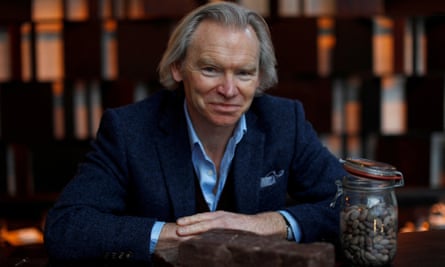How Hotel Chocolat became a £534m prize for Mars | Food & drink industry – MyCyberBase
“I firmly believe that buying Rabot estate was destiny,” said Angus Thirlwell, the co-founder of Hotel Chocolat. A customer clearing out an office sent him a 1920s book about chocolate making just as he was visiting his father in the Caribbean. The book inspired Thirlwell in 2006 to buy the 101-hectare (250-acre) cocoa estate in St Lucia.
“We wanted to get close to the origins of chocolate,” he said in a company video in 2008. “It just made sense to do the opposite of everyone in the industry.”
That outsider attitude helped grow Hotel Chocolat into a retail empire stretching from Inverness in northern Scotland to Truro in Cornwall, with franchise outposts in Japan and online sales in the US. However, rebellious spirit could only get it so far: Hotel Chocolat on Thursday revealed it would be bought out by the US food and confectionery behemoth Mars, in a £534m deal.
It represents a triumph of sorts for Thirlwell and his fellow co-founder, Peter Harris. They and their family trusts still own half of the business and each founder will gain £140m apiece on completion. Thirlwell, who will stay on as chief executive, said he would re-invest in the business alongside Mars, while Harris, who is development director, will mostly cash out as he retires. Yet the sale is also an acknowledgment that going up against big business has its pitfalls.

Thirlwell has sugar in his blood: his father was a director of the ice-cream brand Mr Whippy, and he has claimed to grate chocolate over his breakfast eggs.
After dropping out of university to continue working in business on a placement year in France, Thirlwell returned to the UK. It was during a job interview that he met Harris, who would soon become his business partner.
The gap they spotted in 1987 was in mints: branded mints were a nifty marketing gimmick. Harris and Thirlwell wrapped the first batch of 20,000 from the Mint Marketing Company by hand, but they quickly realised they were on to something bigger. They founded ChocExpress in 1993 to offer chocolate over the internet, before switching the brand to Hotel Chocolat in 2003, and opening their first shop in Watford, Hertfordshire, a year later.
They were on to a winner, as customers relished more sophisticated chocolates with “more cocoa, less sugar” allied to a brand that made much of its “deep sense of fairness” towards its farmers.
In 2010, the company opened its first cafe, followed by a luxury hotel in St Lucia, helped by “chocolate bonds” that paid their lenders in assortments of truffles, pralines and cherry liqueurs.
The stores became familiar on UK high streets even as other British chocolate brands such as Cadbury and Thorntons fell into foreign ownership. In an 2016 interview with the Guardian, Thirlwell said “supermarket chocolate had become boring and rubbish quality” – and much too sugary.
His new bosses, the makers of Mars bars (60g of sugar per 100g), Snickers (45g), Bounty (48g) and Galaxy (55g), clearly will not agree with that assessment, but the Hotel Chocolat brand fills a gap for the US company at the more expensive end of the market in a period when luxury businesses have proved resilient.
after newsletter promotion
There may be other changes afoot. Hotel Chocolat celebrated the history of its Rabot estate with a line of beauty brands named Rabot 1745 and a chocolate themed restaurant of the same name, serving dishes such as guinea fowl with nib-infused organic milk yoghurt that left the Guardian’s reviewer “as queasy as if I’d necked a family-sized Galaxy selection box”.

That brand may warrant a close look from Mars’s marketing department (already stinging from criticism of racial stereotyping of Uncle Ben’s, now just Ben’s rice): 1745 is a reference to the founding date of what Hotel Chocolat in 2020 euphemistically described as a “sugar farm” – a plantation using slave labour. University College London’s Legacies of British Slavery database records a claim worth £1,299, four shillings and sixpence from 1838, when the UK decided to compensate owners of enslaved people for their lost property – in this case 46 humans. Hotel Chocolat’s website says its treatment of farmers on the same plantation sets it apart from the rest of the industry.
Big chocolate’s strength is ruthless efficiency at getting products to customers. That became Hotel Chocolat’s stumbling block in recent years as it aimed for an ambitious expansion into the US and Japan, Thirlwell acknowledged to reporters on Thursday.
“There was huge appeal” with regards taste and pricing for foreign customers, he said, but the problem was “manufacturing, distribution, and the behind-the-scenes things” that customers did not see. The mighty Mars machine will now swing behind the British upstart.
, 2023-11-17 09:57:30 ,
#Hotel #Chocolat #534m #prize #Mars #Food #drink #industry
for more interesting Article Visit regularly : https://mycyberbase.com/





